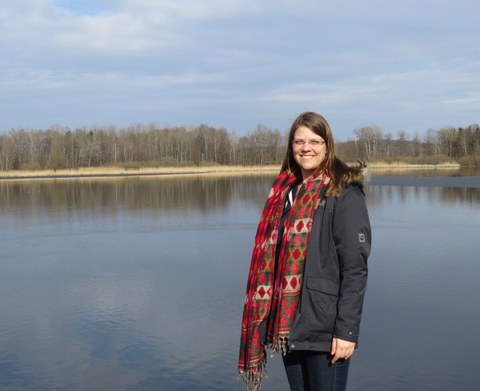"I wanted to study something that combined my interest in the natural sciences and languages."
(surveyed in 2024)
Table of contents
- Why did you choose this degree program and why Dresden?
- Where do you work today and what is your job?
- What does a typical working day look like for you in three sentences?
- How did your career start go for you? When did you know which area you wanted to work in?
- How did you like your studies and how does it help you in your professional life?
- What advice would you give students of your subject from today's perspective?
- What do you particularly remember about your time as a student?
- Where was your favorite place at university? And why?
- You can't have studied in Dresden without...

Dr. Pia Ebeling ist Absolventin des Bachelors und Masters Hydrologie
| Profile of: | Pia Ebeling |
| Degree program: | Hydrology |
| Degree: | Bachelor and Master |
| Study period: | 10/2011 - 05/2018 |
| Current job: | Researcher (PostDoc) |
Why did you choose this degree program and why Dresden?
I wanted to study something that combined my interest in the natural sciences and languages. I was attracted by the fact that the various natural sciences come together in hydrology and that you have many opportunities to work in an international environment. I was also attracted by the interdisciplinarity and social relevance.
Where do you work today and what is your job?
I am a scientist at the Environmental Research Center (UFZ). My core research areas are water quality in river catchment areas, particularly with regard to nutrient inputs and nutrient transport from the landscape into water bodies. This also involves quantifying the substance-related processes and time scales, e.g. How long does it take for nitrogen from fertilizers to end up in the river? How do areas differ and what are the general rules? Answering such questions requires extensive data sets across many areas, so compiling and analyzing them is an important part of my job.
What does a typical working day look like for you in three sentences?
Frequent activities:
- Data management, evaluation and visualization of results using programming --> content-related work
- Presenting and discussing ideas and results, giving and receiving feedback at various levels: within the working group, including supervising students, with colleagues and partners, through to large, international conferences
- Publishing scientific findings including integration into previous work (i.e. reading and writing)
How did your career start go for you? When did you know which area you wanted to work in?
Starting my career went very smoothly straight after my Master's degree. The field came about because I came across interesting doctoral positions during my Master's thesis or was made aware of them.
How did you like your studies and how does it help you in your professional life?
I particularly liked the interdisciplinarity and that is also what helps me now. Because in the field of environmental sciences there are complex systems with many interactions. This includes the variety of processes in which biological, physical and chemical factors play a role, as well as the interaction with humans, who intervene in the system and can change or shift processes, and, if necessary, technical solutions to counter problems. The degree course provided a good introduction to this interdisciplinary field, although the technical elements were perhaps a little larger than I now need in my professional life, but that depends very much on the profession or subject area.
What advice would you give students of your subject from today's perspective?
My tip is: Take advantage of the many opportunities to think outside the box and take time to discover life. The university offers so much that goes beyond the simple, straightforward "studying through" of your own subject and broadens your perspective, which is fantastic. Be it in the field of languages, sports, involvement in committee work, stays abroad or guest students in other disciplines, or or or... In other words, enjoy the wealth of opportunities university life has to offer. I would also recommend being curious about your own subject beyond the prescribed slide content and lectures and thinking about what interesting aspects there actually are that can awaken enthusiasm in you, because sometimes this remains hidden when you are studying for an exam under stress. Exams are important, of course, but ultimately it's about learning.
What do you particularly remember about your time as a student?
The variety of opportunities and the freedom to use them together with friends and fellow students. The variety between lectures, tutorials, breaks, sport, social activities etc. and actually learning new things.
Where was your favorite place at university? And why?
On the benches behind the old canteen under the big trees or on one of the meadows. A cozy atmosphere for breaks and playing cards.
You can't have studied in Dresden without...
visiting the student clubs and going hiking in Saxon Switzerland.
